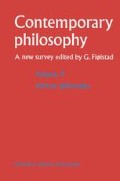Abstract
The problem about an African philosophy, particularly traditional African philosophy, is prompted by the absence of a recognised body of philosophical literature on traditional African societies. Professional philosophers today are presented with the only option available to them: that of accepting the findings of ethnographers, historians and other students of African affairs as the basis for study and determination of an African philosophy. But this move has created its own problem. Henri Maurier observes:
The African philosopher is a ground breaker; He plunges straight into African life as seen in its myths, its beliefs, its rites and in its everyday language. He uses the studies of sociologists and ethnographers; but how accurately defined are his own procedures? Interpretation of myths and rites poses a difficult problem of hermeneutics; how shall the African philosopher show that his interpretation is valid?1
This clearly, has been the main area of concern in the dispute over the very possibility of an African philosophy. Can anyone, it is often asked, deduce a philosophy from myths, symbolic beliefs and rites? Is it possible to present a conceptual analysis of a mythological account of reality?
Access this chapter
Tax calculation will be finalised at checkout
Purchases are for personal use only
Preview
Unable to display preview. Download preview PDF.
Notes
See Henry Naurier’s ‘Do we have an African Philosophy?’, in African Philosophy, Richard Wright ed. (University Press of America, second edition 1979), p. 4.
Jean-Paul Lebeuf as quoted in W.A. Hart’s ‘The Philosopher’s Interest in African Thought’, Cahiers Philosophiques Africain (1972), p. 62.
Robin Horton ‘African Traditional Thought and Western Science’, Rationality, Bryan Wilson, ed. (Oxford: Basil Blackwell, 1970), p. 131.
See J.E. Wiredu, ‘How Not to Compare African Thought with Western Thought’, in African Philosophy, Richard Wright, ed., p. 133.
See W.A. Hart’s ‘The Philosopher’s Interest in African Thought’, Cahiers Philosophiques Africain (1972), p. 62.
See Lorenzo Simpson’s Science Critique and African Culture, p. 2. Prepared for International Research Conference on African Philosophy, Haverford College, Haverford, PA, July 1982. I am indebted to Simpson for his many useful insights into the problem.
Edmund Leach quoted this passage in Genesis as Myth and Other Essays (London, 1969), p. 87.
James Frazer, The Golden Bough: A Study in Magic and Religion (New York, abridged edition 1941(.
Martin Hollis, ‘Reason and Ritual’, The Philosophy of Social Explanation, Alan Ryan, ed. (Oxford University Press, 1973).
Stephen P. Turner, ‘Translating Ritual Beliefs’, Philosophy of Social Science, Vol. 9 (1979), pp. 401–423.
See Hollis, ibid., p. 34.
Ibid., p. 47.
Turner, ibid., p. 403.
Lars Hertzberg, ‘Winch on Social Interpretation’, Philosophy of Social Science, Vol. 10 (1980).
Wiredu, loc. cit., p. 133.
Horton, loc. cit., p. 131.
See Richard Rorty, ‘A Reply to Dreyfus and Taylor’, The Review of Metaphysics, Vol. XXXIV, No. 1 (1980), p. 40.
See D. Bloor, ‘Popper’s Mystification of Objective Knowledge’, Social Studies, Vol. 4 (1974), pp. 65–76.
Sir Karl Popper, The Logic of Scientific Discovery (New York, second edition, 1961).
Jonathan Bennett, Rationality (London: Routledge and Kegan Paul, 1964).
Wolfgang Kohler, The Place of Value in a World of Facts (New York: Liveright, 1938/Mentor, 1966), pp. 36–37.
Bennett, Rationality, p. 108.
Kohler, The Mentality of Apes (London: Lund Humphries & Co., 1931), pp. 16–17.
Thomas Kuhn, ‘Postscript’, The Structure of Scientific Revolutions (Chicago: The University of Chicago Press, 1962), p. 206.
Edo Pivčevic, Concepts, Phenomenology and Philosophical Understanding, Edo Pivčevic, ed. (Cambridge University Press, 1975).
Lorenzo Simpson,loc. cit., p. 10.
Edmund Husserl, The Crisis of the European Sciences and Transcendental Phenomenology (Northwestern University Press, 1970), p. 142.
Ibid., p. 127.
Alfred Schutz, On Phenomenology and Social Relations: Selected Writings, H. Wagner, ed. (Chicago, 1970), p. 59.
W.V.O. Quine, The Ways of Paradox and Other Essays (Cambridge, MA: Harvard University Press, 1976), p. 233.
Edmund Husserl, Crisis, See 28. Here Husserl claims that the transcendental phenomenologist objectifies the background by ‘reactivating’ our sedimented beliefs and ‘validities’.
Ludwig Wittgenstein, On Certainty (New York: Harper and Row, 1969), p. 28.
Ross Harrison, ‘The Concept of Prepredicative Experience’, Phenomenology and Philosophical Understanding, Edo Pivčevic, ed. (Cambridge University Press), p. 95.
Ibid., p. 96.
Ibid., p. 98.
Martin Heidegger, Being and Time (New York: Harper and Row, 1962), p. 122, Sec. 32.
Hubert L. Dreyfus, ‘Holism and Hermeneutics’, The Review of Metaphysics, Vol. XXXIV, No. 1, Issue No. 133 (Sept. 1980), p. 11.
Philip Petit, ‘The Life-world and Role-theory’, Phenomenology, Edo Pivčevic, ed., p. 262.
Author information
Authors and Affiliations
Editor information
Editors and Affiliations
Rights and permissions
Copyright information
© 1987 Martinus Nijhoff Publishers, Dordrecht/Boston/Lancaster
About this chapter
Cite this chapter
Carew, G.M. (1987). Myths, symbols and other life-worlds: The limits of empiricism. In: Fløistad, G. (eds) African Philosophy. Contemporary Philosophy, vol 5. Springer, Dordrecht. https://doi.org/10.1007/978-94-009-3517-4_5
Download citation
DOI: https://doi.org/10.1007/978-94-009-3517-4_5
Publisher Name: Springer, Dordrecht
Print ISBN: 978-94-010-8071-2
Online ISBN: 978-94-009-3517-4
eBook Packages: Springer Book Archive

